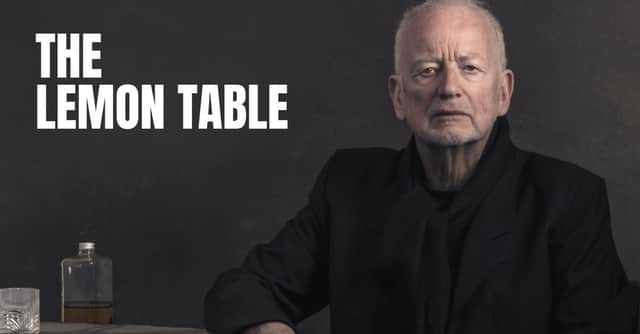The Lemon Table, Sheffield Crucible until Saturday October 30


McDiarmid’s own 70-minute dramatisation of two monologues — Vigilance and The Silence — from The Lemon Table, the Julian Barnes 2005 book of short stories about ageing, uses silence as the theme bringing both pieces together.
Directed impeccably by Michael Grandage and Titas Helder, the austere stage design and lighting set the scene, with a long table, two chairs, a slatted wooden floor for both. An enormous picture frame sits behind, slightly broken at its base, all surrounded by grey curtains. Frankie Bradshaw’s design, Paule Constable’s lighting and Ella Wahlström’s sound design create mystery and a sense of illusion.
Advertisement
Hide AdAdvertisement
Hide AdThe first half, Vigilance, sees a silence-craving concert-goer declaring war on “coughers” disrupting his enjoyment of composers such as Mozart and Sibelius. Gleefully describing the thrill of how he “poked” one man into silence, a frantic McDiarmid is pure comic joy, earning laughter from knowing audience members. His fellow concertgoers “gave me a look”, he says “as if I'm the weirdo!”
Sneezing or even the rustle of “programme turning” sends him into a frenzy. Turning himself into a self-appointed usher, this grumpy old man offers cough sweets, or “spot fines” as he calls them, swears abusively at offenders and even trips one poor man on the stairs.
But suddenly the mood switches as we hear that his estranged partner, Andrew, thinks he should stay at home and listen to CDs, thus undermining his love of the music played live. Andrew, we hear, collects firewood while cycling and himself crudely curses London’s bad car drivers. A wooden table was one of Andrew’s prized pieces as head of the furniture department at the V and A.
Sadness pervades the loss of love after we hear that Andrew stopped going to concerts after our Mr Angry tried to get the phone number of a younger man. But “we don’t talk about that”. The hidden silence is beautifully conveyed.
Advertisement
Hide AdAdvertisement
Hide AdThe Silence sees McDiarmid transformed into the elderly Finnish composer Sibelius, unable to complete “his Eighth” and frightened of the silence he needs to compose as he disappears to the bottom of a whisky bottle. “Music must come from silence and return to it.” He regrets neglecting his long-suffering wife and admits to being an awkward man. But he’s still better than Beethoven!
The Lemon table is the Chinese symbol for death, and Sibelius describes how he gathered round it with a group of men to discuss death and dying. The dead can’t be morbid, he reasons.
McDiarmid is a tour-de-force, deftly employing a huge vocal range and great physicality as he climbs the table to look for his beloved cranes, conduct an orchestra again as he embrace the end of life. “Geese would be beautiful if cranes did not exist,” he says. And in a reference to Samuel Beckett it is “another happy day”.
The two characters are joined by their need for silence and peace, of the things they cannot talk about.
The Lemon Tree cocks an insightful ear to the sound of silence.